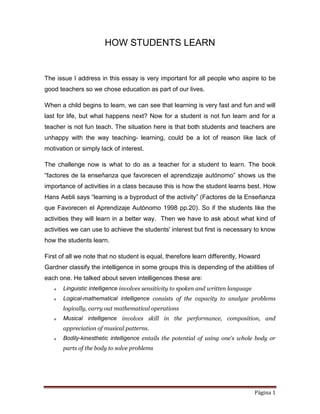
How Students Learn Best
- 1. HOW STUDENTS LEARN<br />The issue I address in this essay is very important for all people who aspire to be good teachers so we chose education as part of our lives.<br />When a child begins to learn, we can see that learning is very fast and fun and will last for life, but what happens next? Now for a student is not fun learn and for a teacher is not fun teach. The situation here is that both students and teachers are unhappy with the way teaching- learning, could be a lot of reason like lack of motivation or simply lack of interest.<br />The challenge now is what to do as a teacher for a student to learn. The book “factores de la enseñanza que favorecen el aprendizaje autónomo” shows us the importance of activities in a class because this is how the student learns best. How Hans Aebli says “learning is a byproduct of the activity” (Factores de la Enseñanza que Favorecen el Aprendizaje Autónomo 1998 pp.20). So if the students like the activities they will learn in a better way. Then we have to ask about what kind of activities we can use to achieve the students' interest but first is necessary to know how the students learn.<br />First of all we note that no student is equal, therefore learn differently, Howard Gardner classify the intelligence in some groups this is depending of the abilities of each one. He talked about seven intelligences these are:<br />Linguistic intelligence involves sensitivity to spoken and written language<br />Logical-mathematical intelligence consists of the capacity to analyze problems logically, carry out mathematical operations<br />Musical intelligence involves skill in the performance, composition, and appreciation of musical patterns.<br />Bodily-kinesthetic intelligence entails the potential of using one's whole body or parts of the body to solve problems<br />Spatial intelligence involves the potential to recognize and use the patterns of wide space and more confined areas.<br />Interpersonal intelligence is concerned with the capacity to understand the intentions, motivations and desires of other people<br />Intrapersonal intelligence entails the capacity to understand oneself, to appreciate one's feelings, fears and motivations (Howard Gardner 1993: xxiii)<br />If the student receives activities that implement his more developed intelligence, learning will be significant. Some materials where we can use different intelligences are: videos, songs, movies and some original texts.<br />Recently a teacher we stressed the importance of knowing students, know what they feel and how they think. If a teacher knows her students, this may carry out activities according to their tastes and will result in good learning.<br />Ausubel (1978) explains in the text quot; conception of learningquot; that learning is divided into two dimensions one referring to the teacher and one to the student. In the dimension of the student talk about how the students learn this could be by memorization or by significant that depends of the teacher and the activity that he implements. Maybe the multiplication tables is a memorization learning and it is not bad because is a process that the student have to pass. I mean that is important the teacher adequate the activities depending of the topic and the students.<br />The second dimension talk about teacher, about methodology or strategies that he will use these could be by learning or reception, as I mention before it is depending of the kind of teacher and the topic that they are addressing.<br />In the same way Kolb explains us the characteristics of the learning of the students; he classified the students in four types in the following chart.<br />Kolb and Fry on learning styles (Tennant 1996)<br />Learning style Learning characteristicDescriptionConvergerAbstract conceptualization + active experimentation· strong in practical application of ideas· can focus on hypo-deductive reasoning on specific problems· unemotional· has narrow interests DivergerConcrete experience + reflective observation· strong in imaginative ability· good at generating ideas and seeing things from different perspectives· interested in people· broad cultural interests AssimilatorAbstract conceptualization + reflective observation· strong ability to create theoretical models excels in inductive reasoning· concerned with abstract concepts rather than people AccommodatorConcrete experience + active experimentation· greatest strength is doing things· more of a risk taker· performs well when required to react to immediate circumstances· solves problems intuitively <br />If we as future teachers, we classify students or rather our students know we can do activities that help them learn more easily.<br />In fact, all have relation; I think the most important here is to know or to appropriate a good methodology to teach and to foment our students all the abilities that could help them to achieve a good learning. Is too easy to realize that the students have a lo of energy to do whatever activity to help them learn but I think is important to inform about the activities that the students can do according with Kolb.<br />I conclusion the students can learn in different ways it is according with the way that the teacher learn and the most important is the activity and we as future teachers have to do or to think about good activities that can learn to students is no just to have fun is both learning and fun.Escuchar<br />Leer fonéticamente<br /> <br />Diccionario - Ver diccionario detallado<br />adverbio <br />recently<br />short time ago<br />lately<br />just now<br />not long since<br />Escuchar<br />Leer fonéticamente<br /> <br />Diccionario - Ver diccionario detallado<br />